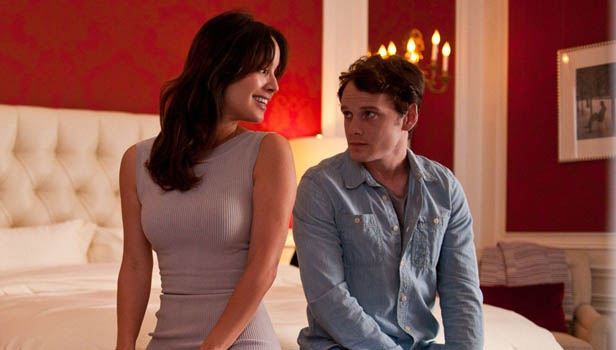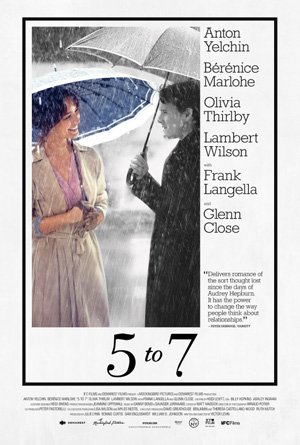
Suitably Mushy 5 to 7 an Enjoyable Literary Romance
Aspiring 24-year-old writer Brian Bloom (Anton Yelchin) spies the beautiful Arielle (Bérénice Marlohe) smoking a cigarette outside of the Manhattan St. Regis. Intrigued, he goes against his normally reserved nature and heads across the street to see if he can make her acquaintance. Somehow his play works, the pair sparking up a conversation that quickly blossoms into more. Thing is, not only is the French woman nine years older, she’s also married with two kids, her husband Valery (Lambert Wilson) a respected diplomat.
Yet he’s perfectly okay with her having an affair. After all, he’s engaged in one, spending time with young literary editor Jane (Olivia Thirlby) when the opportunity arises, doing so with his wife’s full consent. You see, as long as the rules are followed, as long as the canoodling takes place between the hours of five and seven in the early evening, everyone can remain friends. Soon Brian, much to the bewilderment of his parents Arlene (Glenn Close) and Sam (Frank Langella), finds himself becoming part of Arielle and Valery’s extended family, even growing close to the pair’s young children while also catching the watchful eye of Jane in the process.
5 to 7 is a movie about writers, and, as such, struggling writers like myself almost can’t help but relate to certain aspects of it. Victor Levin (Win a Date with Tad Hamilton!), making his feature directorial debut, has assembled his script pretty much as one would expect, Brian going through the various ups and downs this May-December scenario openly hints at while also examining his thought process as he attempts to put words down on paper. Yet there is still a whimsical honesty to the protagonist’s journey I was undeniably drawn to, and while the film itself is far from being a Wonder Boys-style knockout overall I still enjoyed this romantic trifle a fair little bit.
I don’t think this would be the case if Yelchin hadn’t been involved. Some of the voiceover he’s required to deliver can be a little ham-fisted, a little too on-the-nose, yet thanks to his idiosyncratic cadences it never annoys near as much as it probably should. More, his central performance, the way he adroitly dances his way into this relationship with Arielle, how he pieces things together as he navigates strange culturally (and sexually) ambiguous waters, all of it feels natural. Yelchin also just has a knack for tackling scenes and moments in ways that aren’t expected, making his transformation from young man to world-wise adult that much more affecting in the process.
There aren’t a lot of surprises. There really is only one place for Brian and Arielle’s relationship to end up, and while the moment that signifies the end is nigh is played with far more intensity than I was ready for that didn’t make this third act shift in focus and tone any less by the numbers. Yet, Levin manages to get his points across in ways that aren’t always a cliché, and I like the fact the writer’s interactions with Jane – who not unsurprisingly becomes very important – remain more or less strictly professional. On top of that, even though they’re not around much, Arlene and Sam are sensational characters, Close and Langella making the most of their few moments adding color, insight, comedy and candor usually right when the movie needs all of those things the most.
Sadly Marlohe is mostly beauteous window dressing, the fact Arielle becomes anything memorable a testament to the Skyfall actress’ capacious talents more than it has anything to do with either Levin’s writing or his direction. Her face is a sea of emotional tumult, the moment Brian expresses feelings that once stated can never be taken back a truly extraordinary one as far as Marlohe’s shifting reactions are concerned. But, sadly, as an actual human being Arielle is tragically one-dimensional, making her “La femme Robinson” (as Sam likes to call her) nowhere near as interesting as undeniably should have been.
Be that as it may, there’s enough meat of this drama’s bones for me to be more than satisfied by where the film goes and how it ends up getting there. Yelchin, as stated, is terrific, while some of the exclamations Levin ends up expressing one’s I whole-heartedly responded to, his ultimate statement about stories, their focus and whom they’re composed for especially so. 5 to 7 might be slight, but it is so in ways that matter, and like a piece of delicately elating pulp romantic fiction it ends up being a page turner worth reading all the way to the mushily agreeable end.
Film Rating: 3 out of 4






